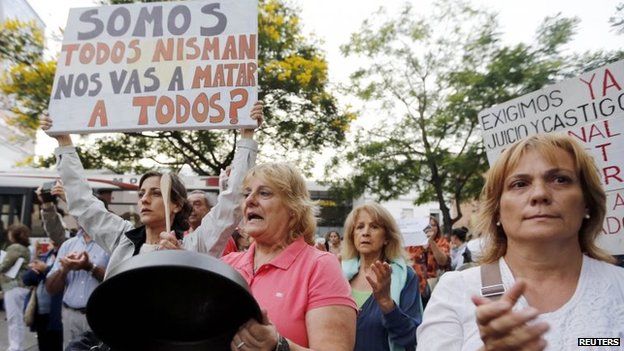Argentine prosecutor Alberto Nisman's death sparks protests
- Published

Thousands of Argentines took to the streets in protest on Monday following the death of prosecutor Alberto Nisman.
Mr Nisman was found shot dead in his apartment in Buenos Aires on Sunday.
He had been investigating the 1994 bombing of a Jewish centre in Buenos Aires in which 85 people died.
Officials said there was no evidence that anyone else was involved in his death, but demonstrators shouted "No more lies!" and demanded a thorough investigation.
Controversial allegations
Mr Nisman's body was discovered just hours before he was due to give evidence to a congressional committee outlining his accusations against Argentina's President Cristina Fernandez de Kirchner.
He had accused the president and Foreign Minister Hector Timerman of involvement in a plot to cover up Iran's alleged role in the 1994 attack on the seven-storey Amia community centre.
The government has dismissed the allegations as ridiculous.
Investigating prosecutor Viviana Fein said that a preliminary autopsy suggested there was "no intervention" by others in Mr Nisman's death.
Mr Nisman's body was found by his mother and one of his bodyguards in the bathroom of his apartment in Buenos Aires.
'Suspicious death'
The apartment had been locked from the inside and the key was still inside the lock.
Forensic tests suggest he died of a single gunshot to his temple at close range, officials said.
The bullet retrieved from his head was fired from the gun which was lying next to his body, ballistic tests suggest.
But Ms Fein said she was investigating whether Mr Nisman may have killed himself after receiving threats.
"We could talk of a suicide, the body was neither beaten nor mistreated, but I don't rule out instigation," she said.
"We are calling his death 'suspicious'," she added.
Protests
Thousands of people demonstrated at different locations in Buenos Aires, including outside the presidential palace, and in number of other Argentine cities.
Protesters banged pots and held up placards reading "Enough!" and "We're not afraid!".
Twenty-eight-year-old Guillermina Sutter-Schneider told newspaper La Nacion that she believed Mr Nisman had "been driven to suicide".
"The government should have protected him," she added.
A government spokesman said Mr Nisman had 10 bodyguards assigned to him, but that they were usually stationed outside his apartment building.
They only entered the apartment after he failed to answer their phone calls.
Explosive report
Forensic experts said Mr Nisman had died between 15:00 (18:00GMT) and 16:00 local time on Sunday.
Four days earlier, he had published a 300-page report alleging that the president and other officials had opened a secret back-channel to Iranians suspected of involvement in the Amia bombing.
Mr Nisman alleged that the scheme was intended to clear the Iranian suspects in order to facilitate a trade deal between Iran and Argentina.
He was asked by opposition lawmaker Patricia Bullrich to give more details of the allegations in a hearing on Monday.
Ms Bullrich said she was shocked by his death, which she called "a grave affront to the country's institutions".
She said that she had spoken to Mr Nisman on the phone on Saturday on three occasions and that he told her he had received several threats.
- Published19 January 2015
- Published18 July 2014
- Published28 February 2013
- Published21 January 2015